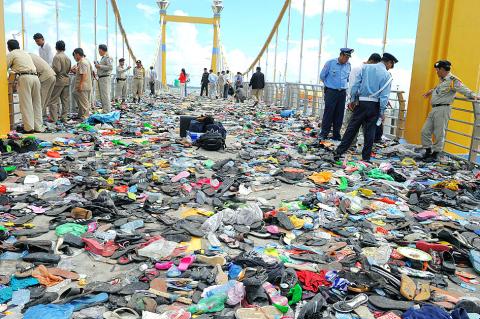Cambodia searched for answers yesterday, one day after a stampede killed at least 375 people on a suspension bridge where survivors said they were wedged into the crowd of living and dead for hours.
The government launched an investigation into why thousands panicked late on Monday on the pedestrian bridge connecting Phnom Penh to man-made Diamond Island, where people were celebrating the last day of the annual Bon Om Touk water festival marking the end of the rainy season.
Survivors recounted scenes of mass suffocation and desperate screams after thousands went into a frenzy to flee the bridge, apparently after shouts went up that some people had been electrocuted. Police said some also shouted that the bridge was about to collapse.

Photo: AFP
The victims suffocated or were trampled and some survivors said they were wedged into the crowd for hours. Police sprayed water so survivors could drink. About 755 people were injured.
“People were shouting that someone had been electrocuted, to run back,” Touch Loch, 18, told Reuters. “I fell and people stepped on me until I passed out. When I woke I was here in hospital.”
Phay Siphan, a government spokesman, denied anyone was electrocuted on the bridge, which was adorned with flashing lights. He said it was designed to sway, but the movement took people by surprise and some shouted it was broken.
“The cause was panic, not electrocution,” he told reporters who gathered in front of the bridge, which was littered with shoes and clothing left by victims.
Touch Theara, 38, said she had been stuck in the crowd for three hours: “I thought I was dead ... Police sprayed water at us. We were just opening our mouths to drink.”
Cambodian Prime Minister Hun Sen apologized for the disaster and ordered an investigation as TV footage showed relatives weeping over bodies of the dead.
“This is the biggest tragedy in more than 31 years after the Pol Pot regime,” he said, declaring tomorrow a day of mourning.

‘ABUSE OF POWER’: Lee Chun-yi allegedly used a Control Yuan vehicle to transport his dog to a pet grooming salon and take his wife to restaurants, media reports said Control Yuan Secretary-General Lee Chun-yi (李俊俋) resigned on Sunday night, admitting that he had misused a government vehicle, as reported by the media. Control Yuan Vice President Lee Hung-chun (李鴻鈞) yesterday apologized to the public over the issue. The watchdog body would follow up on similar accusations made by the Chinese Nationalist Party (KMT) and would investigate the alleged misuse of government vehicles by three other Control Yuan members: Su Li-chiung (蘇麗瓊), Lin Yu-jung (林郁容) and Wang Jung-chang (王榮璋), Lee Hung-chun said. Lee Chun-yi in a statement apologized for using a Control Yuan vehicle to transport his dog to a

Taiwan yesterday denied Chinese allegations that its military was behind a cyberattack on a technology company in Guangzhou, after city authorities issued warrants for 20 suspects. The Guangzhou Municipal Public Security Bureau earlier yesterday issued warrants for 20 people it identified as members of the Information, Communications and Electronic Force Command (ICEFCOM). The bureau alleged they were behind a May 20 cyberattack targeting the backend system of a self-service facility at the company. “ICEFCOM, under Taiwan’s ruling Democratic Progressive Party, directed the illegal attack,” the warrant says. The bureau placed a bounty of 10,000 yuan (US$1,392) on each of the 20 people named in

The High Court yesterday found a New Taipei City woman guilty of charges related to helping Beijing secure surrender agreements from military service members. Lee Huei-hsin (李慧馨) was sentenced to six years and eight months in prison for breaching the National Security Act (國家安全法), making illegal compacts with government employees and bribery, the court said. The verdict is final. Lee, the manager of a temple in the city’s Lujhou District (蘆洲), was accused of arranging for eight service members to make surrender pledges to the Chinese People’s Liberation Army in exchange for money, the court said. The pledges, which required them to provide identification

INDO-PACIFIC REGION: Royal Navy ships exercise the right of freedom of navigation, including in the Taiwan Strait and South China Sea, the UK’s Tony Radakin told a summit Freedom of navigation in the Indo-Pacific region is as important as it is in the English Channel, British Chief of the Defence Staff Admiral Tony Radakin said at a summit in Singapore on Saturday. The remark came as the British Royal Navy’s flagship aircraft carrier, the HMS Prince of Wales, is on an eight-month deployment to the Indo-Pacific region as head of an international carrier strike group. “Upholding the UN Convention on the Law of the Sea, and with it, the principles of the freedom of navigation, in this part of the world matters to us just as it matters in the